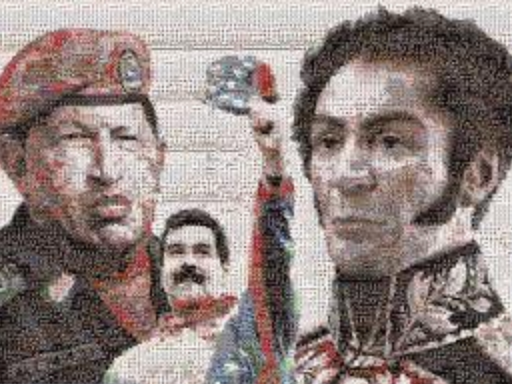@NicolasMaduro: “Today the fifth of July, 202 years after the declaration of Independence we have a Bolivarian Fatherland. Let there be no mistake. Long live Bolívar and Chávez!”.
July 5 promises to be a day full of heady symbolism and ritual as Venezuela simultaneously celebrates 202 years of independence and commemorates the five months that have past since the death of Hugo Chávez Frias. It also provides another opportunity for Nicolas Maduro to seek to transfer Chávez’s charisma to his own mandate as president.
Maduro will preside over a ceremony celebrating military promotions at the Cuartel de la Montaña, where Chávez’s remains lie, before presiding over a civilian military parade in Los Proceres.
As we argued previously, all modern nation-states construct forms of civil religion in order to consolidate the loyalty of their citizens. And the “Bolivarian religion” is a phenomenon that dates back at least to the end of the XIX century, well before Chávez´s coming to power (see Luis Castro Leiva’s seminal book). Bolivarianism was used by all Venezuelan governments of the twentieth century as part of their legitimating strategies.
Indeed Chávez was immersed in the nationalist rhetoric of the cult of Bolivar and the Independence struggle during his formative years in the Military Academy.
But the current government has carried this cult to a higher level, adding the figure of the recently deceased Chávez to the pantheon of national heroes right next to Bolivar himself. Chávez is now routinely referred to as the Comandante Supremo or Comandante Enterno in official the media. A state television outlet has even run an animated clip in which Chávez meets Simón Bolívar, and other Latina American popular heroes, in the afterlife, confirming his status as a member of the heroic pantheon.
Although it was finally decided not to embalm Chávez’s remains, they now rest in the Cuartel de la Montaña which has become a rival to the Panteón Nacional as the sanctuary of Venezuelan Bolivarian religion. Tour guides at the Cuartel correct those who refer to Chavez in the past tense, suggesting he is still with us.
President Maduro’s discourse, like Chávez’s before him, permanently seeks to transport the audience to a mythical sacred time of Venezuela’s Nineteenth Century independence struggle, an illo tempore which is constantly reenacted in the present Bolivarian revolution.
On June 24th, the 192nd anniversary of the Battle in Carabobo that sealed Venezuela’s independence from Spain, Maduro sought to link past with present. According to state media Maduro “emphasized that it is impossible for a patriot to speak of the Father of the nation [Bolívar] and the Battle of Carabobo, without feeling indignation in the face of any form of imperialist domination. This spirit of independence was rescued by the leader of the Bolivarian Revolution, Hugo Chávez.”
During his visit to Italy in mid-June, President Maduro made a stop at Monte Sacro, Rome, where he “renewed” the oath made by Simón Bolívar in 1813 that he would not rest until liberating the Spanish American colonies from imperial tyranny. Maduro explained “the oath at Monte Sacro has a sacred value for us; it is intrinsic to the values of loyalty and compromise that were resurrected by the Comandante Hugo Chávez, who also swore, in 1982 in the Valles de Aragua, in front of the Samán de Güere, to achieve the necessary independence of our country.”
Just the day before Maduro presided over the 200th anniversary of the 1813 proclamation of the “Decreto de Guerra a Muerte” during the bloody war of independence. The decree stated that Spanish nationals would be executed unless they actively conspired against Spanish tyranny. Maduro traveled to the interior city of Trujillo to celebrate the date and stressed the need to define who is who: “We live in a time of definitions of those who are in favor of fascism and those who are in favor of the democratic fatherland.”
Later in the day Maduro again referred to the decree underlining the continuity between the struggle for independence and the current revolutionary struggle: “It’s the same struggle between the empire and the fatherland, between the colonial power and independence, between traitors to the fatherland (vendepatrias) and patriots. It’s the same struggle…”




